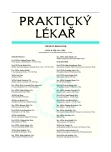-
Medical journals
- Career
Measuring the quality of life of family caregivers
Authors: R. Bužgová; P. Endelová
Authors‘ workplace: Vedoucí: doc. PhDr. Darja Jarošová, Ph. D. ; Ústav ošetřovatelství a porodní asistence ; Lékařská fakulta ; Děkan: doc. MUDr. Arnošt Martínek, CSc. ; Ostravská univerzita v Ostravě
Published in: Prakt. Lék. 2010; 90(10): 597-601
Category: Of different specialties
Overview
The aim of the paper was to find out how family caregivers who take care of an elderly person at home assess their quality of life in the following domains:
– the environment,
– the elderly person’s health status,
– caregiver’s health status,
– caregiver’s meaning of life,
– the quality of care provided,
– relationship,
– finance.
We also attempted to determine whether certain factors (sex, relationship, a caregiver’s age, the way of living, the type of care, the duration of caregiving, an elderly person’s self-sufficiency) influence a family caregiver’s quality of life.
A standardized QOLLTI – F (Quality of Life in Life Threatening Illness – Family) questionnaire was used to determine a family caregiver’s quality of life.
Family members (n = 86) were contacted through home care agencies. The domains of finance and satisfaction with an elderly person’s health status were regarded as the worst. The caregivers meaning of life was rated higher by women than by men. Caregivers younger than 40 years who have been taking care of an elderly person for less than 2 years regarded their quality of life as the worst. Caring for family members and their support should become an essential part of home care for the elderly.Key words:
quality of life, family caregiver, old people, home care.
Sources
1. Coohen, R., leis, AM., Kuhl, D. et al. Quality of life in life threatening illness - family. Palliat. Med, 2006, 20(8), p. 755-767.
2. Haškovcová, H. Thanatologie: nauka o smrti a umírání. 2. přepr. vyd. Praha: Galén, 2007. 244 s. ISBN 978-80-7262-471-3.
3. Hellstrom, Y., Hallberg, I.R. Perspectives of elderly people receiving home help on health, care and quality of life. Health Soc. Care Community 2001, 9, p. 61-71.
3. Hirokazu, A., Miwa, N., Kei, H. The relationship between health-related quality of life and social network among Japanese family caregivers for people with disabilities. Biopsychosoc Med. 2008, 2, 17. Published online 2008 October 1. doi: 10.1186/1751-0759-2-17.
4. Hnilicová, H. Kvalita života a její význam pro medicínu a zdravotnictví. In Payne, J. a kol. Kvalita života a zdraví. 1. vyd. Praha: Triton, 2005, s. 205-216.
5. Jeřábek, H. Péče o staré lidi v rodině (východiska, klasifikace, kritické momenty). In Jeřábek, H. a kol. Rodinná péče o staré lidi. 1. vyd. Praha: CESES FSV UK, 2005, s. 7-8.
6. Jeřábek, H. Rodinná péče o seniory jako „práce z lásky“: nové argumenty. Czech Sociological Review 2009, 45(2), s. 243-265.
7. Morito, T., Schreiner, A.S., Asano, H. Caregiver burden and health-related quality of life among Japanese stroke caregivers. Age Ageing 2003, 32(2), p. 218-223.
8. Persson, C., Östlund, U., Wennman-Larsen, A. et al. Health-related quality of life in significant others of patients dying from lung cancer. Palliat. Med. 2008, 22, p. 239-247.
9. Ministerstvo práce a sociálních věcí. Předběžná národní zpráva o zdravotní a dlouhodobé péči v České republice [online]. MPSV, 2005 [cit. 25. 1. 2010]. Dostupný z WWW: http://www.mpsv.cz/cs/1341.
10. Rubášová, M. Solidarita v rodině: genderové role v péči o závislé osoby. In Jeřábek, H. a kol. Rodinná péče o staré lidi. Praha: CESES FSV UK, 2005, s. 42-48.
11. Tabáková, M., Václavíková, P. Záťaž opatrovatela v domácom prostredí. Profese online 2008, 1, 2, s. 77-88.
12. Topinková, E. Péče o staré v rodině. Lze identifikovat rizikové rodiny s vysokou mírou pečovatelské zátěže? Prakt. Lék., 1995, 75, 7-8, s. 366-369.
13. Tošnerová, T. Pocity a potřeby pečujících o starší rodinné příslušníky. Praha: Ambulance pro poruchy paměti, Ústav lékařské etiky 3. LF UK, 2001. ISBN 80-238-8001-2.
14. Tošnerová, T. Příručka pečovatele. [online]. Praha: Ambulance pro poruchy paměti, Ústav lékařské etiky 3. LF UK, c2009, 30 s. [cit. 2009-11-08]. Dostupný z WWW: http://www.umirani.cz/ res/data/002/000296.htm.
15. Tremont, G., Davis, J.D., Bishop, D., Fortinsky, R.H. Telephone-delivered psychosocial intervention reduces burden in dementia caregivers. Dementia 2008, 7(4), p. 503-520.
16. Zavázalová, H., Vožehová, S., Zaremba, V., Zikmundová, K. Vybrané kapitoly ze sociální gerontologie. 1. vyd. Praha: Karolinum, 2001. 97 s. ISBN 80-246-0326-8.
Labels
General practitioner for children and adolescents General practitioner for adults
Article was published inGeneral Practitioner

2010 Issue 10-
All articles in this issue
- Burn-out syndrome in physicians
- Measuring the quality of life of family caregivers
- Some special questions dealing with the institution of advance directives
- Professional satisfaction of physicians and nurses in general practice settings
- Alcohol consumption and its situation in the Czech Republic
- Adrenal carcinoma – pitfalls of diagnosis
- Current review of the diagnosis and treatment of pancreatic cancer
-
Evolution and evolutionary theory for physicians
X.: Self-awareness. - Continuing postgraduate education of general practitioners and E-learning in the Czech Republic
-
What should a general practitioner know about drinking water?
Part II. Health risks associated with water - Dyspnoea in elderly subjects caused by respiratory diseases
- General Practitioner
- Journal archive
- Current issue
- Online only
- About the journal
Most read in this issue- Dyspnoea in elderly subjects caused by respiratory diseases
- Burn-out syndrome in physicians
- Current review of the diagnosis and treatment of pancreatic cancer
- Continuing postgraduate education of general practitioners and E-learning in the Czech Republic
Login#ADS_BOTTOM_SCRIPTS#Forgotten passwordEnter the email address that you registered with. We will send you instructions on how to set a new password.
- Career

